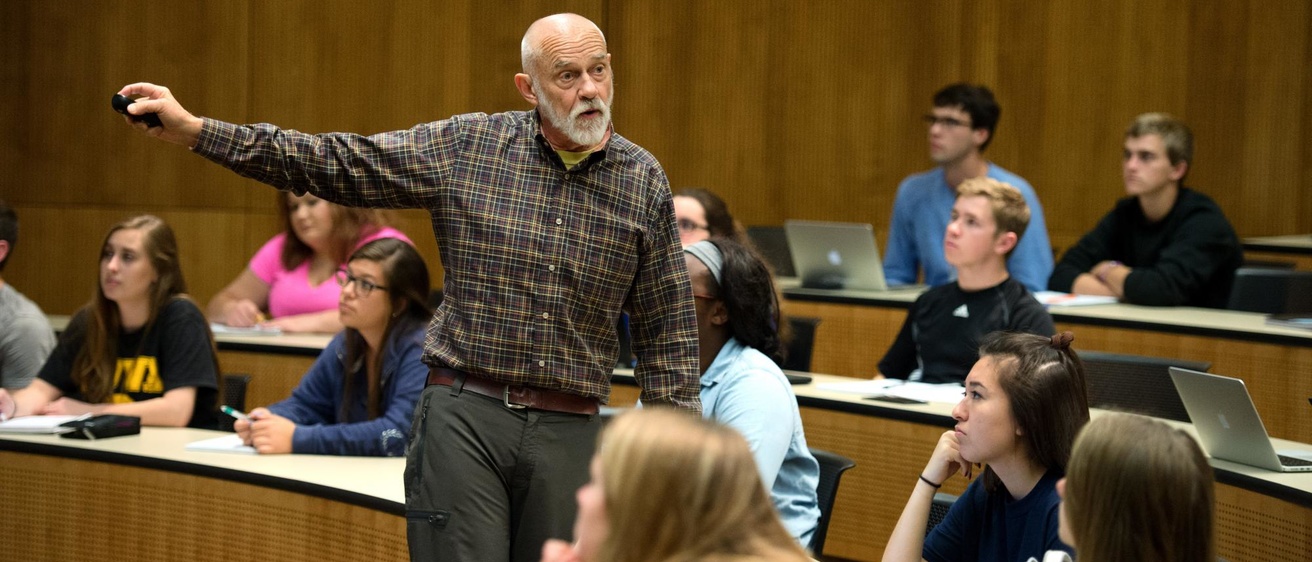David Osterberg walks to the front of the lecture hall, stops, and turns toward his students.
“Fracking—has anyone heard of fracking?”
Some students peer cautiously over their laptops; others look anxiously at each other. Someone mentions it has to do with recovering gas and oil.
Osterberg, a clinical professor in the Department of Occupational and Environmental Health at the University of Iowa College of Public Health, nods enthusiastically, and the class seems relieved but curious.
Osterberg steps closer to his listeners and explains that fracking is short for hydraulic fracturing, a process of drilling down into the earth and creating fractures in the rock by pumping in and pressurizing a mixture of water, chemicals, and sand. Sand is critical to fracking—it keeps the cracks propped open so that oil and gas are released.
The state of Iowa’s connection to fracking is the sand found in the rolling hills of Winneshiek, Allamakee, and Clayton counties, Osterberg explains.
But wait! Isn’t this class called Fundamentals of Public Health (MPH:2099)? What does fracking have to do with public health?
“Public health is one of those degrees people don’t think about right away. Then students find public health, and it’s like this bright light opens up, and they realize, ‘This is what I was meant to do.’”
—Jason Daniel-Ulloa, UI College of Public Health assistant research scientist
An awful lot, says Osterberg, who goes on to explain how frac-sand mining in Iowa has raised concerns about the destruction of the environment as well as the contamination of groundwater and the proliferation of crystalline silica dust known to cause silicosis and cancer of the lungs.
“Public health includes a whole lot of things,” Osterberg says.
Instructor Jason Daniel-Ulloa, an assistant research scientist in the Department of Community and Behavioral Health at the UI College of Public Health, says the field is often epiphanic for students who don’t want a career in medicine but still feel called to improve the well-being of others.
“Public health is one of those degrees people don’t think about right away,” he says. “Then students find public health, and it’s like this bright light opens up, and they realize, ‘This is what I was meant to do.’”
So, what is the difference between medicine and public health?
Doctors and nurses treat diseases and injuries one patient at a time; public health practitioners, researchers, and educators work to prevent disease and injury. Public health practitioners focus on communities and populations. They seek to find causes and implement solutions.
Fundamentals of Public Health is a course offered through the UI College of Public Health designed to introduce students to the field while emphasizing pertinent issues, challenges, achievements, and potential careers. Beginning in fall 2016, the UI will offer a bachelor’s degree in public health and the Fundamentals course will be part of the undergraduate curriculum.
Students enrolled in the course are introduced to historical events and scientific evidence that serve as a foundation for public health practice and research. They hear about the five core public health knowledge areas: biostatistics, social and behavioral sciences, epidemiology, healthy policy and management, and environmental health sciences.
Typically, each week begins with a Tuesday lecture and ends with a Thursday discussion or class exercise. Daniel-Ulloa says he often invites guest speakers such as Osterberg to the class as a way of exposing students to different voices and to keep them engaged.
Alexandra Gritton, a junior from Belle Plaine, Iowa, who hopes to receive a certificate in public health to compliment her degree in athletic training, says learning about topics such as sand mining has been an eye-opening experience.
“I have lived in Iowa almost my whole life,” she says. “I knew about the sand mining, but I never really thought about the impact it had. It’s been really interesting.”
First-year student Shane Riley, from Ottumwa, Iowa, agrees.
“It makes you think about what’s going on around you,” he says. “And it makes you wonder, ‘Are there things going on I don’t know about?’”
